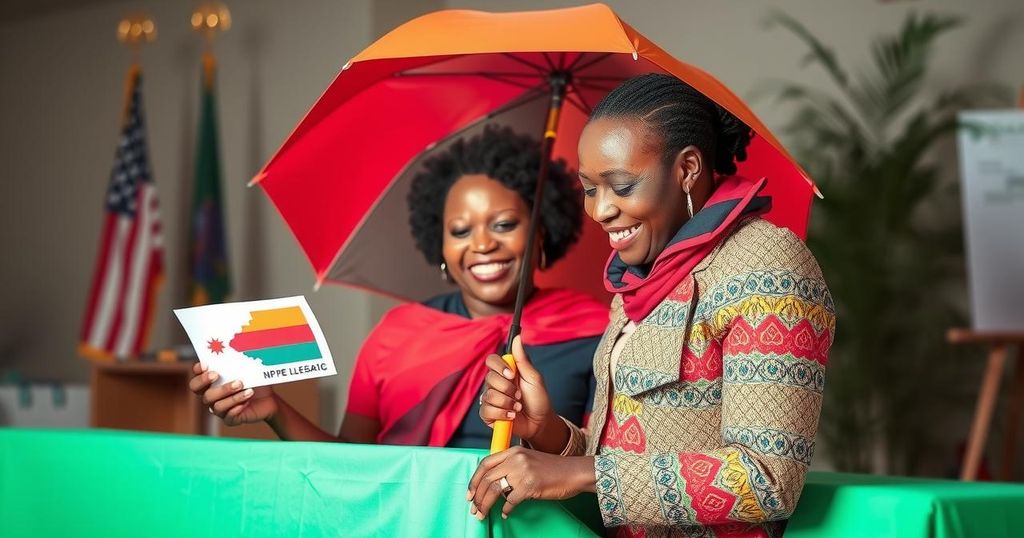Duma Boko’s election as Botswana’s president marks a historic shift as the opposition UDC defeats the long-ruling BDP. While this victory reflects a desire for change, concerns grow that the UDC’s pro-business orientation may undermine its electoral promises. The broader regional context reveals similar discontent with traditional ruling parties, raising questions about the efficacy of pro-business reforms in addressing systemic inequality.
On November 1, Duma Boko of the Umbrella for Democratic Change (UDC) was sworn in as Botswana’s president, marking the first instance of an opposition party gaining power in the nation’s history. This unprecedented shift followed the parliamentary elections in October, where UDC emerged victorious by securing 35 of the 61 National Assembly seats, significantly diminishing the Botswana Democratic Party’s (BDP) hold, which had governed since 1966.
The electoral outcome symbolizes a pronounced desire for change among various demographics, including the working class, youth, and rural communities, after decades of BDP governance. This shift forms part of a broader trend throughout the region, characterized by increasing discontent with traditional ruling parties, attributable to growing inequality, poverty, state oppression, and the rising cost of living, which has been exacerbated by factors such as the war in Ukraine and the austerity measures imposed by the International Monetary Fund.
Similar trends have been observed in neighboring countries; South Africa’s African National Congress (ANC) lost its majority, while Namibia’s SWAPO continues to lose ground electorally, even winning with a contested majority. Mozambique experienced severe unrest following disputed elections, leading to substantial casualties among protestors following police action. The international Pabloite movement, alongside its affiliates, has sought to present these pro-business parties as viable alternatives, which they assert will better serve the needs of the people, potentially diverting the current momentum towards a more socialist agenda.
In an article titled “Left Victory in Botswana,” Paul Martial, a contributor to International Viewpoint and associated with the French New Anti-capitalist Party (NPA), characterizes the UDC’s victory positively, suggesting a profound commitment to social democracy. He highlights the UDC’s emphasis on social themes, such as youth employment and the provision of a national health insurance scheme aimed at improving access to healthcare. He argues that implementing such policies necessitates a shift in wealth distribution against the nation’s affluent minority.
However, a critical examination reveals the UDC’s promises as largely aspirational. Under President Boko’s leadership, the party’s pro-business stance suggests significant compromises may occur, as it aims to attract foreign direct investment and address the challenges facing Botswana’s economy. Boko himself has indicated the necessity for economic liberalization and reduced bureaucratic regulations, translating into potential privatizations and cuts within public sectors.
Furthermore, Boko has prioritized reinforcing ties with De Beers, a crucial player in Botswana’s diamond mining sector, thereby demonstrating a continuation of reliance on corporate interests rather than a shift towards social equity. In his inaugural address, Boko underscored the importance of maintaining a robust partnership with De Beers, emphasizing mutual benefit in promoting Botswana’s diamond export strategies.
The UDC’s calls for economic diversification to tap into other mineral resources are framed within a pro-capitalist agenda, which raises concerns regarding the actual benefits to the working class. Moreover, Boko’s collaboration with the Southern African Development Community (SADC) to establish a military logistics base further illustrates a heightened willingness to resort to forceful measures to quell dissent.
Martial’s portrayal of the UDC is a misrepresentation that seeks to align the party with historical socialist movements while overlooking its alignment with capitalist interests. This reveals a broader tendency within the Pabloite factions that historically support bourgeois nationalist and social democratic parties, despite their complicity in exacerbating socio-economic struggles in regions like Botswana. In this ongoing struggle, the emphasis must shift towards mobilizing for socialist solutions that prioritize worker empowerment and oppose imperialism, recognizing the necessity of integrating local and international working-class movements.
The political landscape in Botswana experienced a significant upheaval with the election of Duma Boko as president, representing the opposition UDC. The defeat of the long-standing BDP marks a critical moment in the country’s political history, reflecting a growing demand for systemic change among the populace. This shift is indicative of wider regional trends, wherein traditional ruling parties face diminishing support as citizens respond to increasing economic and social inequalities. The evolving political dynamics speak to the importance of understanding the intersection between local governance and broader socio-economic forces, particularly in the context of external pressures, such as international economic policies and geopolitical conflicts.
The election of Duma Boko and the UDC signifies a momentous shift in Botswana’s political landscape, reflecting widespread discontent with long-standing governance and a desire for change. However, the UDC’s pro-business orientation and potential abandonment of promises raise questions about the future administration’s commitment to progressive social change. The need for genuine worker representation and socialist solutions remains critical in addressing the deep-seated inequalities that have persisted under previous regimes. It is essential for the working class to mobilize to assert their interests and challenge the inherent limitations of the current political trajectory.
Original Source: www.wsws.org






